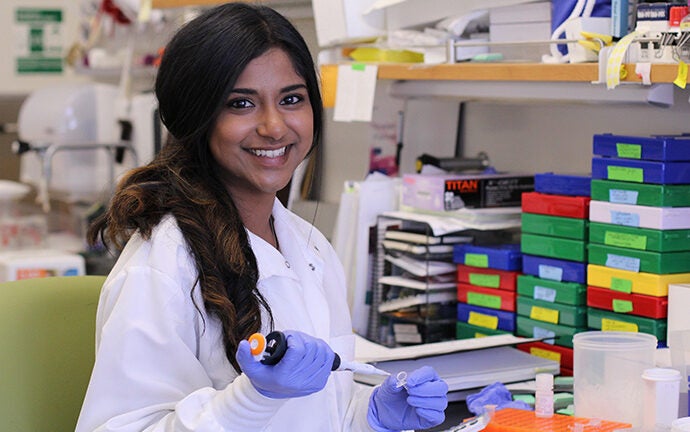
Alumna Natasha Natarajan looks to the future of stem cells
“Everyone in this audience right now, you all started out as a stem cell,” said Natasha Natarajan at the 2017 TEDxUSC conference. “And then your DNA came in, did all the work and differentiated each group of your stem cells into your muscles, into your heart, into your brain, until we get the finished product: you.”
Natarajan’s eyes sparkled as she described the potential of stem cell research — which has been a passion of hers since she was 15 years old. As a student taking Advanced Placement biology at Beverly Hills High School, she won a writing competition about stem cells hosted by Cedars-Sinai Medical Center. Her prize was the opportunity to work in the UCLA laboratory of Jianyu Rao, who was studying how green tea affects stem cells.
“I’m kind of a stem cell geek,” said Natarajan. “I’m really into it.”
When it came time to apply to college, Natarajan was excited to learn about stem cell opportunities at USC, including the Eli and Edythe Broad Center for Regenerative Medicine and Stem Cell Research at USC.
The university already held a special place in her heart. Her parents met while working at the Keck School of Medicine of USC, and her oldest sister and older brother both graduated from USC Dornsife. Her older brother is now pursuing both his M.D. and master of public health degree at USC.
“We’re a big Trojan family,” said Natarajan, who graduated from USC Dornsife with her bachelor’s degree in human biology in May. She was one of six 2017 Dornsife Scholars, an honor that includes a $10,000 prize and recognizes undergraduates who combine academic excellence in the letters, arts and sciences with the aspiration to have a positive impact on the world.
She made her first foray into stem cells at USC as an undergraduate, with a course taught by Gage Crump, associate professor of stem cell biology and regenerative medicine. She then joined his lab, where she has spent more than two years working to understand how zebrafish regenerate their damaged, arthritic joints.
In addition to participating in medical research as an undergraduate, Natarajan studied abroad in Oxford, England, and Cape Town, South Africa.
“My dad is actually the first Indian surgeon from Johannesburg,” she said. “He left during apartheid. So it was a lot of struggle for him to even become a surgeon. And once he was a surgeon, the system kept not allowing him to achieve. So USC made him an offer, and he moved to the U.S. I did some volunteering and shadowing in a hospital in South Africa, and it gave me a lot more context for what it must have been like for my dad to do all of that.”
Back at USC, she continued to pursue her interest in medicine as co-editor-in-chief of “The Healing Process,” a magazine that explores health and well-being through the lens of art and literature.
Natarajan is now pursuing a progressive master’s degree in stem cell biology and regenerative medicine at USC. After completing the program, she intends to amplify her positive impact by attending medical school.
“Being a physician is a priority to me, and stem cells are a passion,” she said. “I want to be a doctor that uses these innovative stem cell therapies and actually implements them in patients.”